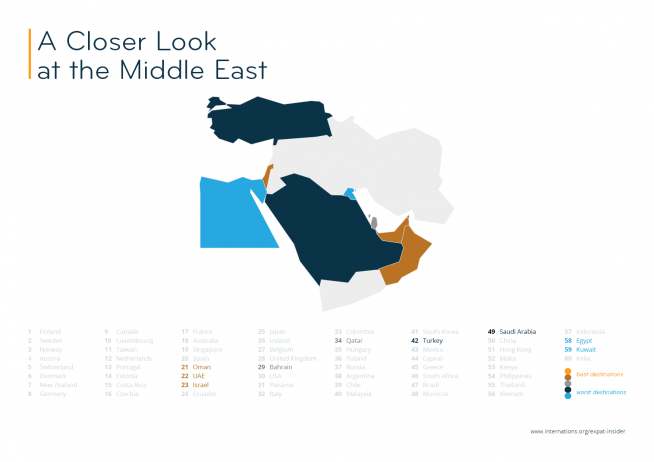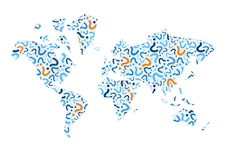A Closer Look at the Middle East
21. Oman
Oman comes 21st in the Environment & Sustainability Ranking and is the highest-ranking among the Middle Eastern countries featured in the survey. The country comes in 17th place in the Quality of the Environment subcategory. More than three in four expats (76%) rate the air quality positively (vs. 62% globally), and another 93% give the natural environment a positive rating (vs. 82% globally). A British expat specifically mentions how much she likes “Oman’s natural environment, the wadis, and the mountains”. In the Policies & People subcategory, Oman comes 20th worldwide. It is one of those countries whose results show a difference between the attitudes of the government and the public towards environmental issues: just 46% of expats agree that the population is very interested in environmental issues (vs. 48% globally), whereas 70% think that the government supports policies that protect the environment (vs. 55% globally). Lastly, Oman scores significantly lower, coming in 32nd place, in the Products & Utilities subcategory. While more than three out of four expats rate the energy supply positively (77% vs. 62% globally), just half of them judge the availability of green goods and services favorably (50% vs. 63% globally).
22. United Arab Emirates
While the United Arab Emirates ranks 22nd overall in the Environment & Sustainability Ranking, it lands in the bottom 10 for its natural environment (52nd). Just 57% of expats rate this factor positively, compared to 82% globally. Despite a higher-than-average satisfaction with the factors water and sanitation (75% satisfied vs. 72% globally) and air quality (54% vs. 62% globally), the country therefore lands in a mediocre 42nd place out of 60 in the Quality of the Environment subcategory. The country does better in the Policies & People subcategory (14th), with 77% of expats agreeing that the government supports policies to protect the environment (vs. 55% globally). A Nigerian expat mentions that she likes the “high level of environmental protection” in the UAE. This factor helps to boost the overall ranking, despite the poor performance in the Quality of the Environment subcategory. In the Products & Utilities subcategory, UAE comes 19th, with seven in ten expats (70%) rating the energy supply positively (vs. 62% globally) and 64% giving the waste management and recycling infrastructure a positive rating (vs. 60% worldwide).
23. Israel
Israel ranks 23rd out of 60 countries in the Environment & Sustainability Ranking, with very similar results for all factors featured in the survey. It comes in 21st place in the Quality of the Environment subcategory, its best performance: About two in three expats (66%) rate the air quality in Israel positively (vs. 62% globally), and 82% are happy with the water and sanitation infrastructure (vs. 72% globally). In the Products & Utilities subcategory, Israel comes 25th, with 61% of expats satisfied with the country’s energy supply (vs. 62% globally) and 64% rating the availability of green goods and services positively (vs. 65% globally). With Israel ranking 29th out of 60, the Policies & People subcategory is the country’s weak point, but it still ends up in upper half of the global ranking. In fact, 51% of expats agree that the population cares a lot about environmental issues, which is just above the global average (48%). The same is true for the government: 55% of think that the Israeli government supports policies to protect the environment (vs. 55% globally).
29. Bahrain
Bahrain comes in 29th place out of 60 destinations worldwide in the Environment & Sustainability Ranking. The country performs best in the Policies and People subcategory (18th): 72% of expats agree that the government supports policies to protect the environment (vs. 55% globally). However, the local population seems to care a little less. Just 49% of expats think that the local residents are very interested in environmental issues, which is about the same as the global average (48%). In the Products & Utilities subcategory, Bahrain comes 31st:55% of expats rate the availability of green goods and services positively (vs. 63% globally), and 52% are satisfied with the local waste management and recycling efforts (vs. 60% globally). The Middle Eastern country does, however, significantly worse in the Quality of Environment subcategory (46th). A British expat lists “the lack of public green spaces” among the things she does not like about living in Bahrain. In fact, the country even ranks in the bottom three for its natural environment (58th), just ahead of India (59th) and Kuwait (60th). Only 39% rate this factor positively (vs. 82% globally).
34. Qatar
Qatar comes in at 34th place out of 60 countries in the Environment & Sustainability Ranking, doing quite well in the Policies and People subcategory (22nd). About two-thirds of the respondents (65%) believe the government supports policies to protect the environment (vs. 55% globally). However, just 40% agree that the population is very interested in environmental issues, compared to 48% globally. The Gulf State comes in 35th place in the Products & Utilities subcategory, with 65% of expats rating the energy supply positively (vs. 62% globally) and 52% being satisfied with the availability of green goods and services (vs. 63% globally). A Canadian expat suggests that there is still room for improvement: “There is a lack of green options, but things are changing. There are more local and fresher foods now!” Similar to its neighbor Bahrain, Qatar does not do well in the Quality of Environment subcategory (49th), particularly when it comes to its natural environment (56th). Close to three in ten expats (29%) are unhappy with this factor, compared to 9% globally. The country also ranks below average for its air quality (38% happy vs. 62% globally) and just about average for water and sanitation (77% happy vs. 72% globally).
42. Turkey
Turkey comes in at 42nd place overall in the Environment & Sustainability Ranking. It ranks 36th worldwide in the Quality of the Environment subcategory, with the respondents expressing slightly below-average satisfaction with the respective rating factors. Almost four in five expats (78%) rate the natural environment positively (vs. 82% globally), but just three in five (59%) are happy with the local air quality (vs. 62% globally). The country comes in at 43rd place out of 60 in the Products & Utilities subcategory, with only 42% of expats rating the waste management and recycling efforts positively. This is 18 percentage points below the global average (60%). A Canadian expat specifically mentions that he does not like the “traffic, pollution, and lack of recycling” in Turkey. Additionally, about three in ten respondents (31%) are not satisfied with the availability of green goods and services (vs. 21% globally), and fewer than half of them (47%) are happy with the country’s energy supply (vs. 62% globally). In the survey respondents’ opinion, neither politicians nor the people seem to worry much about this: just one in three expats (33%) thinks that the Turkish government supports policies to protect the environment (vs. 55% globally), and 42% say that the population is not very interested in environmental issues either (vs. 30% globally). This results in a low 46th rank for Turkey in the Policies & People subcategory.
49. Saudi Arabia
Ranking a low 49th out of 60 countries in the Environment & Sustainability Ranking, Saudi Arabia even lands among the bottom 10 countries worldwide in the Quality of Environment subcategory (52nd). Close to three in ten respondents (29%) rate the natural environment negatively, which is more than three times the global average (9%). Only Bahrain (58th), India (59th), and Kuwait (60th) rank lower for this factor. Regarding the Policies & People subcategory (35th), where Saudi Arabia performs best, 50% of expats believe that the government supports policies to protect the environment. However, this is still five percentage points below the global average (55%). Additionally, fewer than one in four respondents (24%) state that the local population very is interested in environmental issues, only half of the global average (48%). Lastly, Saudi Arabia also performs poorly for all three factors featured in the Products & Utilities subcategory (47th): the availability of green goods and services (40% happy vs. 63% globally), the energy supply (54% vs. 62% globally), and the local waste management and recycling infrastructure (40% vs. 60% globally). “I do not like the total reliance on a car, the lack of recycling programs, and the lack of green spaces”, an Australian expat sums it up.
58. Egypt
Coming 58th out of 60 countries in the Environment & Sustainability Ranking, Egypt ends up among the bottom 3 worldwide in all subcategories of the survey. In the Products & Utilities subcategory, only India (60th) ranks worse than Egypt (59th). Not even a fifth of the survey participants (18%) rate the local waste management and recycling efforts positively (vs. 60% globally), and just 21% are satisfied with the country’s energy supply (vs. 62% globally). There seems to be “no care for the environment”, a Polish expats remarks. In fact, only 22% of expats think the government supports policies to protect the environment (vs. 55% globally), and even fewer respondents (13%) agree that the population is very interested in environmental issues (vs. 48% globally). Only Kuwait (60th) ranks even worse for the latter factor (60th). Lastly, Egypt comes 58th in the Quality of the Environment subcategory: Only 34% of expats rate the water and sanitation infrastructure positively (vs. 72% globally), and more than half the respondents (52%) are unhappy with the air quality in Egypt. This is 28 percentage points above the global average (24%). Moreover, fewer than half of the respondents (49%) are satisfied with the natural environment (vs. 82% globally). A US American expat describes the ‘’dirtiness of the environment’’ as one of the worst aspects of life in Egypt.
59. Kuwait
Coming in 59th place out of 60 destinations in total, Kuwait only ranks ahead of India (60th) in the Environment & Sustainability Ranking. It lands in the bottom 10 worldwide for all rating factors featured in the survey — except for one: energy (e.g. availability of sustainable energy and saving energy), for which it comes in 50th place. Even so, 38% of expats are unhappy with this factor, far more than the global average (18%). Additionally, expats are unsatisfied with the availability of green goods and services (23% happy vs. 63% globally) and the local waste management and recycling infrastructure (17% vs. 60% globally). This results in Kuwait’s low 57th rank in the Products & Utilities subcategory. The results look even worse regarding the Policies & People and the Quality of the Environment subcategories, with Kuwait ranking 59th in both. The country performs worst worldwide for its natural environment (60th), which only 12% of the respondents are satisfied with (vs. 82% globally). On top of that, 36% of expats rate the local water and sanitation infrastructure negatively (vs.15% globally). An Australian expat points out that the ‘’poor sanitation and inept waste management’’ are among the worst things in Kuwait. Finally, the results look similarly grim in the Policies & People subcategory, with nearly three out of four respondents (74%) considering the population not very interested in environmental issues (vs. 30% globally). Additionally, only 28% think that the government supports policies to protect the environment, which is 27 percentage points less than the global average of 55%.




